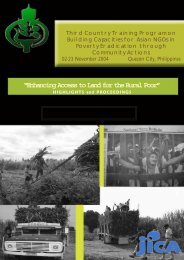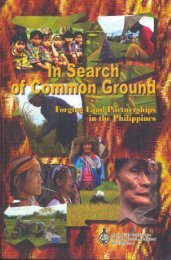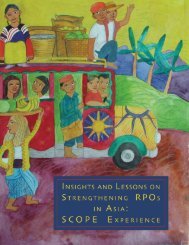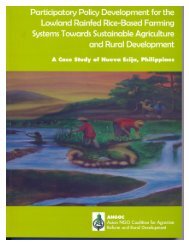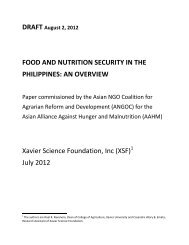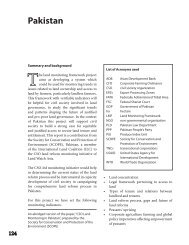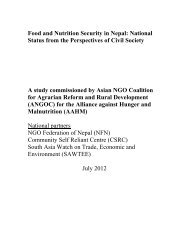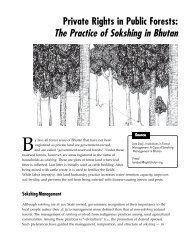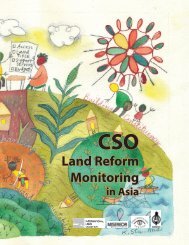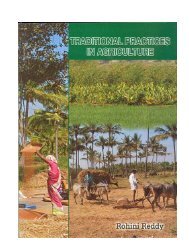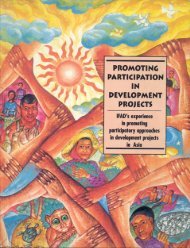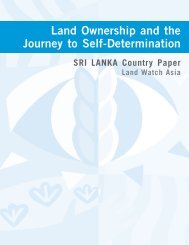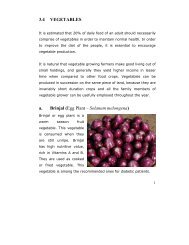Securing the Right to Land FULL - ANGOC
Securing the Right to Land FULL - ANGOC
Securing the Right to Land FULL - ANGOC
You also want an ePaper? Increase the reach of your titles
YUMPU automatically turns print PDFs into web optimized ePapers that Google loves.
Table 4. con’t.<br />
India<br />
Indonesia<br />
Nepal<br />
THE PROLONGED STRUGGLE FOR LAND RIGHTS IN ASIA<br />
29<br />
Congress Party has formulated laws on land reform and has directed state governments <strong>to</strong> enact laws<br />
that would enhance land access for <strong>the</strong> landless, including tribals. Its Economic Agenda stipulates that<br />
land reforms must receive high priority alongside <strong>the</strong> consolidation of fragmented landholdings.<br />
Donor agencies and international donors.<br />
Donor agencies have played an important part in supporting India’s land reform movement. These include<br />
<strong>the</strong> Ford Foundation, ActionAid and Christian Aid. International financial institutions (IFIs) and<br />
o<strong>the</strong>r donor agencies under <strong>the</strong> neo-liberal framework have pushed for market-assisted land reform models.<br />
Private sec<strong>to</strong>r.<br />
The private sec<strong>to</strong>r is increasingly involved in corporate farming, prompting a land buying spree. It has<br />
already acquired vast tracts of land and has entered in<strong>to</strong> agreements with farmers with major investments<br />
<strong>to</strong> tap <strong>the</strong> potential of Indian agriculture.<br />
Civil society.<br />
NGO networks in India operate at <strong>the</strong> national and regional level: <strong>the</strong> Association of Voluntary Agencies<br />
for Rural Development (AVARD) and <strong>the</strong> Voluntary Action Network of India (VANI) work nationwide.<br />
People’s Organizations (POs) working on land issues generally have a non-formal structure. A few of <strong>the</strong><br />
many POs working on land issues and supporting <strong>the</strong> land rights movements in India include Wada No<br />
Todo Abhiyan, Ekta Parishad <strong>the</strong> Campaign for Survival and Dignity, and <strong>the</strong> National Campaign for <strong>Land</strong><br />
and Livelihood (NCLL).<br />
Government.<br />
President Susilo Bambang Yudhoyono’s paramount concern is infrastructure development. The sec<strong>to</strong>rs<br />
identified as key <strong>to</strong> Indonesia’s future development were power, water and sanitation, oil and gas facilities,<br />
information technology, transport, and logistics. Pres. Yudhoyono passed Presidential Regulation No. 36 of<br />
2005 <strong>to</strong> relax regulations concerning land leases and concessions. The government’s agrarian and agricultural<br />
policies are also enshrined in <strong>the</strong> Revitalization of Agriculture, Fisheries and Forestry (RPPK).<br />
CSOs and NGOs.<br />
NGOs and CSOs attribute <strong>the</strong> current agrarian crisis <strong>to</strong> three fac<strong>to</strong>rs: <strong>the</strong> concentration of ownership of<br />
land and o<strong>the</strong>r natural resources among a small group of owners; inefficiency of production as a result of<br />
feudalistic practices; and state violence and <strong>the</strong> government’s anti-democratic and anti-peasant policies.<br />
Multilateral development agencies and IFIs.<br />
These groups are increasingly involved in integrating free trade and <strong>the</strong> allocation of agrarian resources<br />
in <strong>the</strong> country, as exemplified by <strong>the</strong> <strong>Land</strong> Administration Project (LAP), which seeks <strong>to</strong> establish land<br />
markets. Big infrastructure projects funded by <strong>the</strong> World Bank and <strong>the</strong> ADB have also resulted in violations<br />
of people’s rights.<br />
<strong>Right</strong>s-holders/Tenants and landless groups.<br />
Successive farmers’ movements have been undertaken by peasants and tenants since <strong>the</strong> 1950s. They<br />
have been triggered by mainly landlords’ abuses, widespread famine, and <strong>the</strong> demand for land rights.<br />
Civil society organizations.<br />
The Community Self-Reliance Centre (CSRC) is one of <strong>the</strong> NGOs at <strong>the</strong> forefront of advocacy for <strong>the</strong><br />
land rights of <strong>the</strong> poor. The National <strong>Land</strong> <strong>Right</strong>s Concern Group (NLRCG) was also established as a broader<br />
civil society alliance, which includes media groups, human rights advocates and social activists. The<br />
National <strong>Land</strong> <strong>Right</strong>s Forum (NLRF) is a membership based national people’s organization of land deprived<br />
people including marginalized groups.<br />
ASIAN NGO COALITION FOR AGRARIAN REFORM AND RURAL DEVELOPMENT



